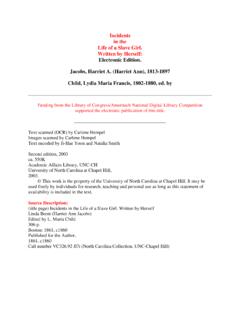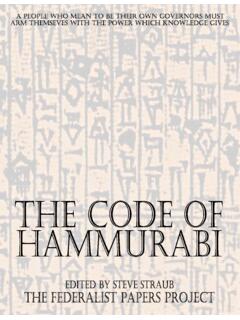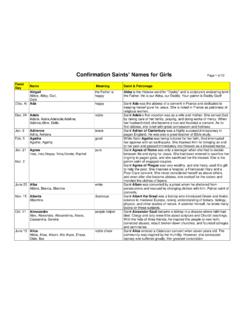Transcription of Our founding ideals of liberty and equality were false ...
1 Our founding ideals of liberty and equality were false when they were written. Black Americans fought to make them true. Without this struggle, America would have no democracy at Nikole Hannah-Jones Artwork by Adam PendletonAugust 18, 201915 The 1619 Project16My dad always fl ew an American fl ag in our front yard. The blue paint on our two- story house was perennially chipping; the fence, or the rail by the stairs, or the front door, existed in a perpetual state of disrepair, but that fl ag always fl ew pristine. Our corner lot, which had been redlined by the federal gov-ernment, was along the river that divided the black side from the white side of our Iowa town. At the edge of our lawn, high on an alu-minum pole, soared the fl ag, which my dad would replace as soon as it showed the slightest tatter.
2 My dad was born into a family of sharecroppers on a white plan-tation in Greenwood, Miss., where black people bent over cotton from can t- see- in- the- morning to can t- see- at- night, just as their enslaved ancestors had done not long before. The Mississippi of my dad s youth was an apartheid state that subju-gated its near- majority black pop-ulation through breathtaking acts of violence. White residents in Mis-sissippi lynched more black people than those in any other state in the country, and the white people in my dad s home county lynched more black residents than those in any other county in Mississippi, often for such crimes as entering a room occupied by white women, bumping into a white girl or trying to start a sharecroppers union.
3 My dad s mother, like all the black peo-ple in Greenwood, could not vote, use the public library or fi nd work other than toiling in the cotton fi elds or toiling in white people s houses. So in the 1940s, she packed up her few belongings and her three small children and joined the fl ood of black Southerners fl eeing North. She got off the Illinois Central Rail-road in Waterloo, Iowa, only to have her hopes of the mythical Promised Land shattered when she learned that Jim Crow did not end at the Mason- Dixon , as we called her, found a house in a segregated black neighborhood on the city s east side and then found the work that was considered black women s work no matter where black women lived cleaning white people s houses.
4 Dad, too, struggled to fi nd promise in this land. In 1962, at age 17, he signed up for the Army. Like many young men, he joined in hopes of escaping poverty. But he went into the military for another reason as well, a reason common to black men: Dad hoped that if he served his country, his country might fi nal-ly treat him as an Army did not end up being his way out. He was passed over for opportunities, his ambition stunt-ed. He would be discharged under murky circumstances and then labor in a series of service jobs for the rest of his life . Like all the black men and women in my family, he believed in hard work, but like all the black men and women in my family, no matter how hard he worked, he never got when I was young, that fl ag outside our home never made sense to me.
5 How could this black man, having seen fi rsthand the way his country abused black Americans, how it refused to treat us as full citi-zens, proudly fl y its banner? I didn t understand his patriotism. It deeply embarrassed had been taught, in school, through cultural osmosis, that the fl ag wasn t really ours, that our his-tory as a people began with enslave-ment and that we had contributed little to this great nation. It seemed that the closest thing black Amer-icans could have to cultural pride was to be found in our vague con-nection to Africa, a place we had never been. That my dad felt so much honor in being an American felt like a marker of his degradation, his acceptance of our most young people, I thought I understood so much, when in fact I understood so little.
6 My father knew exactly what he was doing when he raised that fl ag. He knew that our people s contributions to build-ing the richest and most powerful nation in the world were indelible, that the United States simply would not exist without August 1619, just 12 years after the English settled Jamestown, Va., one year before the Puritans land-ed at Plymouth Rock and some 157 years before the English colonists even decided they wanted to form their own country, the Jamestown colonists bought 20 to 30 enslaved Africans from English pirates. The pirates had stolen them from a Por-tuguese slave ship that had forcibly taken them from what is now the country of Angola. Those men and women who came ashore on that August day were the beginning of American slavery.
7 They were among the million Africans who would be kidnapped from their homes and brought in chains across the Atlantic Ocean in the largest forced migra-tion in human history until the Sec-ond World War. Almost two million did not survive the grueling journey, known as the Middle Passage. Before the abolishment of the international slave trade, 400,000 enslaved Africans would be sold into America. Those individuals and their descendants transformed the lands to which they d been brought into some of the most successful colonies in the British Empire. Through back-breaking labor, they cleared the land across the Southeast. They taught the colonists to grow rice. They grew and picked the cotton that at the height of slavery was the nation s most valuable commodity, account-ing for half of all American exports and 66 percent of the world s supply.
8 They built the plantations of George Washington, Thomas Jeff erson and James Madison, sprawling proper-ties that today attract thousands of visitors from across the globe cap-tivated by the history of the world s greatest democracy. They laid the foundations of the White House and the Capitol, even placing with their unfree hands the Statue of Freedom atop the Capitol dome. They lugged the heavy wooden tracks of the rail-roads that crisscrossed the South and that helped take the cotton they picked to the Northern textile mills, fueling the Industrial Revo-lution. They built vast fortunes for white people North and South at one time, the second- richest man in the nation was a Rhode Island slave trader. Profi ts from black people s stolen labor helped the young nation pay off its war debts and fi nanced some of our most prestigious uni-versities.
9 It was the relentless buy-ing, selling, insuring and fi nancing of their bodies and the products of their labor that made Wall Street a thriving banking, insurance and trading sector and New York City the fi nancial capital of the world. But it would be historically inac-curate to reduce the contributions of black people to the vast materi-al wealth created by our bondage. Black Americans have also been, and continue to be, foundational to the idea of American freedom. More than any other group in this country s history, we have served, generation after generation, in an overlooked but vital role: It is we who have been the perfecters of this United States is a nation founded on both an ideal and a lie.
10 Our Declaration of Independence, signed on July 4, 1776, proclaims that all men are created equal and endowed by their Creator with cer-tain unalienable rights. But the white men who drafted those words did not believe them to be true for the hun-dreds of thousands of black people in their midst. life , liberty and the pursuit of Happiness did not apply to fully one-fi fth of the country. Yet despite being violently denied the freedom and justice promised to all, black Americans believed fervently in the American creed. Through cen-turies of black resistance and protest, we have helped the country live up to its founding ideals . And not only for ourselves black rights strug-gles paved the way for every other rights struggle, including women s and gay rights, immigrant and dis-ability rights.




